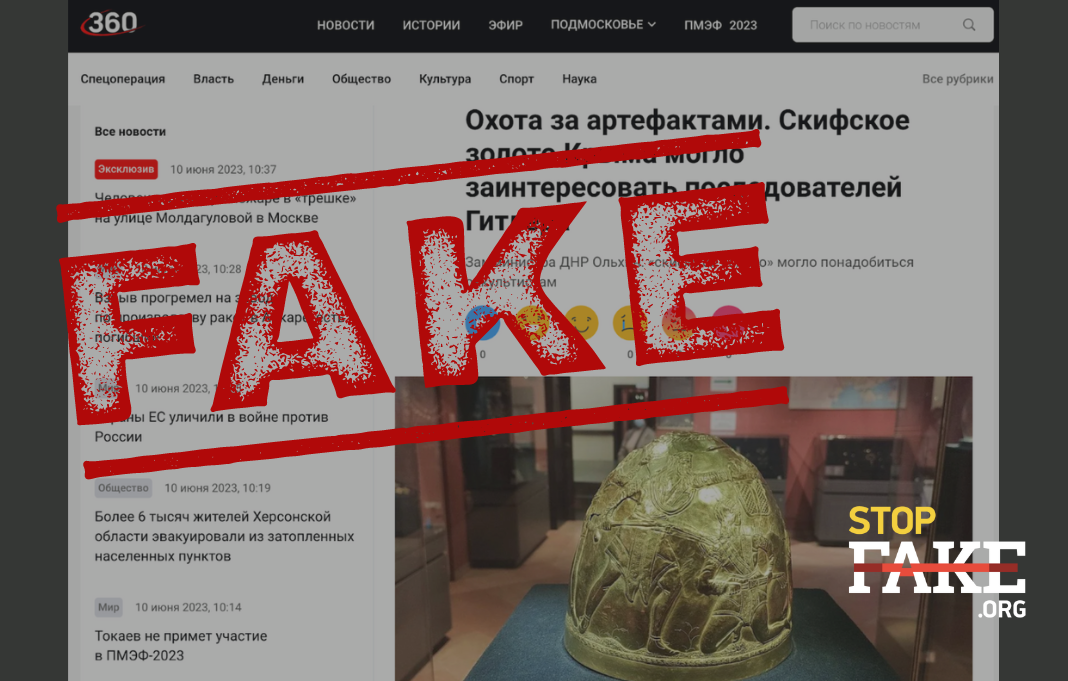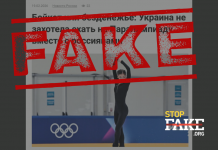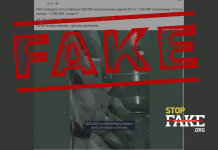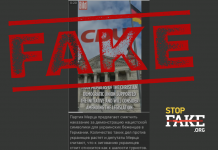Ukraine is the legal owner of the Crimean museums exhibits, which is confirmed by international law and multiple decisions of various courts. In Ukraine, the process of accumulating historical artifacts is not ideological.
The Russian media spread loads of misinformation about the Netherlands Supreme Court on June 9 confirming the decision of the previous authorities regarding the return of the collection ‘Crimea – a Golden Island in the Black Sea’ to Ukraine. Pro-Kremlin media said that the court’s decision was caused not only by the “complete degradation of the international law system in Europe“, but also by the “Nazi” tendencies of the EU countries and Ukraine. Russian “historians” have seriously stated that the Scythian gold is being returned to its rightful owner only for “occult” reasons. Allegedly, Ukraine and Europe are collecting “magical artifacts” in order to defeat Russia “with their help”.
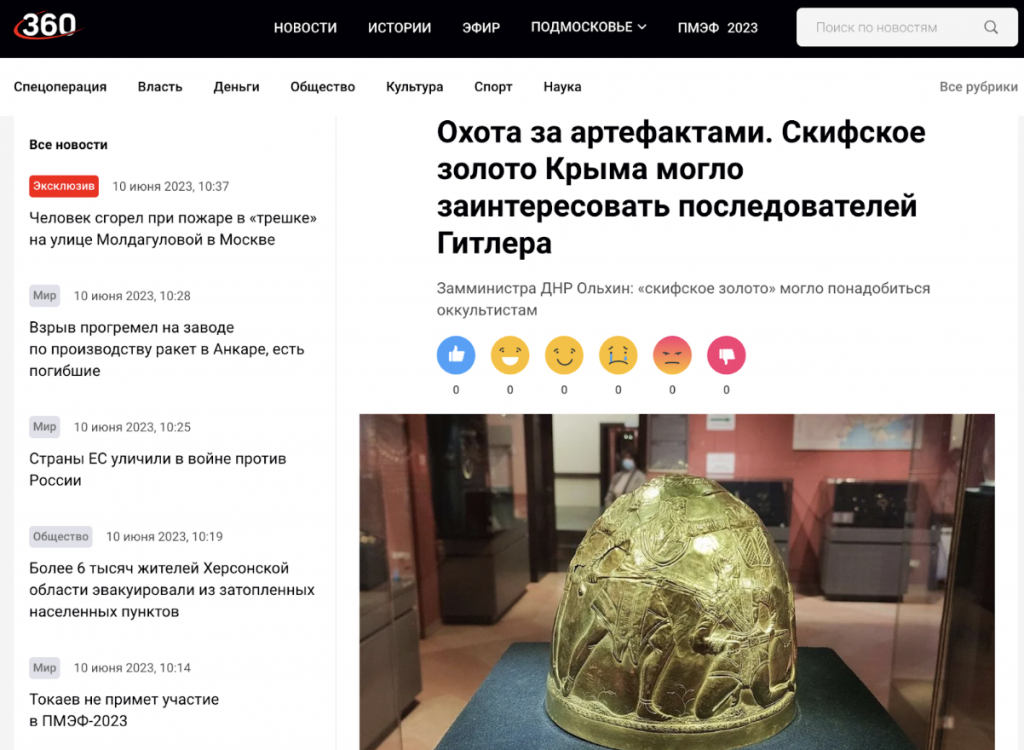
“It is possible that some dark forces are behind this: it is not surprising that there are plenty of wealthy people in Europe who believe in the magical power of such artifacts… It is easy to draw a parallel with the Third Reich: Hitler had special occult units that were also looking for various antique objects … Such trends did not escape Ukraine either… A professor named Valery Bebyk said that in order for Ukraine to defeat all its enemies, it needs to collect all the artifacts the Third Reich had, as well as certain items that belonged to Attila, the leader of the Huns.”, – the Russian media write.
Russian narratives about the collection “Crimea – a Golden Island in the Black Sea“, which was kept in the Netherlands for nine years of lawsuits, transformed from statements like “Russia is not involved and the Crimean museums are suing Ukraine themselves” to conclusions about the European judicial system being completely broken. Finally, Russian propaganda transitioned to an obvious conspiracy theory about the occultism of Hitler’s followers.
In a comment for StopFake Evelina Kravchenko, a senior researcher at the Archeology Institute of the Ukrainian National Science Academy, explains: Russian propaganda about Ukraine and Europe being prone to occultism, like the Germans during the Second World War, is not new at all. According to Kravchenko, this pseudo-scientific theory dates back to the 19th century. Such conspiracy theory is popular in Russia because the aggressor country has not yet morally left the ideology of the last century.
“This conspiracy theory is spreading because Russian society has not yet emerged from the middle of the 20th century. Their ideology and social morality have remained exactly at that level. We’ve gone through it all, Europe has gone through it, so we take it as a funny thing and they take it seriously and start discussing it. Actually, in the middle of the 20th century, these conspiracy theories were very popular, and they appeared as early as the 19th century as a pseudoscientific branch of German philosophy. By the way, Karl Marx is also a German philosopher and this is a huge scientific school. This was a strange branch that developed into a relapse of Nazism in the 20th century. Germany survived and eradicated it, and therefore neither we nor Europe understand why the Russians spread such theories,” said Evelina Kravchenko.
The historian emphasizes that Russian conspiracy theory is not grounded in any scientific proof or reality at all. According to Kravchenko, in Ukraine, the process of accumulating artifacts is not ideological, in contrast to Russia, which has been actively producing pseudoscientific theories since the USSR era.
“The most interesting thing about the accumulation of artifacts and all these Aryan theories is that Moscow itself is connected. This theory appeared there in the 80s, right before the Soviet Union collapsed. So Moscow is not the one to call us fascists. Russia should better look at where their money goes and how they finance the spread of such pseudo-theories, how they are promoted by the central channels of their television and how it affects their society,” Kravchenko emphasized.
Besides, Evelina Kravchenko commented on another Russian statement that the collection of Scythian gold should not be returned to Ukraine, since there is “nowhere to store” artifacts and they can be kept “exclusively in Crimea.” The historian emphasizes that this statement is completely unfair, and the collection “Crimea is a Golden Island in the Black Sea” can be located in any of the country’s museums. The only problem is Russia, which is constantly shelling civil Ukrainian cities, destroying not only human lives, but also Ukraine’s historical and cultural heritage.
“In Ukraine, there are so many museums and places to store archaeological artifacts, we at the institute are currently working on a new concept of the archaeological museum of Ukraine… Talking only about Kyiv, then we have the Ukrainian House, which I consider a wonderful museum space, we have the Arsenal, we’ve got a lot of buildings like former factories, we’ve got some great empty spaces in the city center, if you’re looking for a new place for a collection. Regarding the temporary storage of the collection, this is not an issue at all, because the exhibition is not that big. It will fit perfectly in one hall at any of our museums. The only question is that currently it is dangerous, because the main goal of Russia is to discredit and destroy. Therefore, the main issue for us now is the preservation and protection of our artifacts from Russia,” Evelina Kravchenko summarized.
Ukraine’s lawsuits over the “Crimea – Golden Island in the Black Sea” collection, which includes more than 500 items from the Ukrainian museum fund with a total value of 10 million euros, have been ongoing since the temporary occupation of Crimea. On December 14, 2016, the Amsterdam District Court ruled that the Crimean museums exhibits should be returned to Ukraine, but in January 2017, the “Crimean museums”, backed by Russia, began appealing the decision. On October 26, 2021, the Amsterdam Appeal Court decided to return the collection of Scythian gold from the Crimean museums to Ukraine, rejecting Russian claims for the exhibits.
Then the occupiers filed a cassation appeal. As a reminder, the Russian curator of this exhibition who advocated returning the collection to the Russian-occupied Crimea was Valentina Mordvintseva, a defector from the Crimean branch of the Archeology Institute of the Ukrainian National Science Academy.
On June 9, 2023, the Netherlands Supreme Court confirmed that the Scythian gold belongs to Ukraine and the collection will be returned to its rightful owner.
Learn more about Ukraine’s fight for Scythian gold in the StopFake stories Scythian Gold must Return to Ukraine, Dutch Court Rules. Russian Media Explodes in Indignation and Crimean defector archaeologists and the Kremlin’s strategy fighting for Scythian gold.


